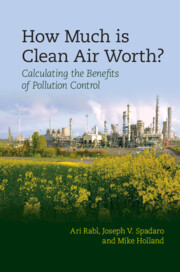Book contents
- Frontmatter
- Contents
- List of figures
- List of tables
- Foreword
- Preface
- Acknowledgements
- 1 Introduction
- 2 Tools for environmental impact and damage assessment
- 3 Exposure–response functions for health impacts
- 4 Impacts of air pollution on building materials
- 5 Agriculture, forests and ecosystems
- 6 Other impacts
- 7 Atmospheric dispersion of pollutants
- 8 Multimedia pathways
- 9 Monetary valuation
- 10 The costs of climate change
- 11 Uncertainty of damage costs
- 12 Key assumptions and results for cost per kg of pollutant
- 13 Results for power plants
- 14 Results for waste treatment
- 15 Results for transport
- 16 Lessons for policy makers
- Appendix A Nomenclature, symbols, units and conversion factors
- Appendix B Description of the RiskPoll software
- Appendix C Equations for multimedia model of Chapter 8
- Index
Appendix B - Description of the RiskPoll software
Published online by Cambridge University Press: 05 July 2014
- Frontmatter
- Contents
- List of figures
- List of tables
- Foreword
- Preface
- Acknowledgements
- 1 Introduction
- 2 Tools for environmental impact and damage assessment
- 3 Exposure–response functions for health impacts
- 4 Impacts of air pollution on building materials
- 5 Agriculture, forests and ecosystems
- 6 Other impacts
- 7 Atmospheric dispersion of pollutants
- 8 Multimedia pathways
- 9 Monetary valuation
- 10 The costs of climate change
- 11 Uncertainty of damage costs
- 12 Key assumptions and results for cost per kg of pollutant
- 13 Results for power plants
- 14 Results for waste treatment
- 15 Results for transport
- 16 Lessons for policy makers
- Appendix A Nomenclature, symbols, units and conversion factors
- Appendix B Description of the RiskPoll software
- Appendix C Equations for multimedia model of Chapter 8
- Index
Summary
RiskPoll is an integrated risk assessment program for calculating health and environmental impacts and damage costs (also known as external costs) associated with routine atmospheric pollutant emissions from stationary sources. RiskPoll includes several routines for assessing inhalation and ingestion doses from exposure to particulate matter (PM10), sulfur dioxide (SO2), oxides of nitrogen (NOx), carbon monoxide (CO), secondary aerosols (nitrates and sulfates), and toxic metals (arsenic, cadmium, chromium, mercury, nickel and lead). Health impacts of air pollution are calculated using an impact pathway analysis, which traces the fate of a pollutant in the environment from point of emission into the air, to environmental dispersion and eventual receptor uptake. Health impacts include loss of life expectancy (mortality) and various morbidity diseases (e.g., asthma attacks, chronic bronchitis and hospital visits). Quantification of the impacts and damage costs follows the methodology developed by the ExternE Project of the European Commission. The multimedia impact assessment is based on the transfer factors published by the US Environmental Protection Agency. In addition to health effects, RiskPoll also computes impacts and costs to agricultural crops and building materials (based on the work by ExternE).
In contrast with existing environmental impact assessment models, the RiskPoll methodology is more transparent, easier to implement and requires fewer user input data, this is an especially important advantage for applications in developing countries where lack of data oftentimes excludes the use of very detailed programs. The RiskPoll user can clearly identify relationships between input parameters that matter the most in the impact analysis and then do sensitivity studies to investigate how the final results might change. RiskPoll can also serve as a pedagogic tool for both beginners and experts, because very detailed documentation, with explanations of the concepts and links to internet resources, is directly integrated into the software.
- Type
- Chapter
- Information
- How Much Is Clean Air Worth?Calculating the Benefits of Pollution Control, pp. 655 - 656Publisher: Cambridge University PressPrint publication year: 2014



